 The first time I held a chicken was in college. She was a small white creature with big amber-hued eyes. I imagine the most unwanted thing she wanted to endure was being passed amongst a bunch of college kids. Stiff with fear, it was not the best way for chicken and human to meet.
The first time I held a chicken was in college. She was a small white creature with big amber-hued eyes. I imagine the most unwanted thing she wanted to endure was being passed amongst a bunch of college kids. Stiff with fear, it was not the best way for chicken and human to meet.A few years later I started volunteering at a sanctuary for farmed animals. I wandered amongst the hens, roosters and turkeys roaming a verdant field. What I remember most is their song, their talking. If there is one thing anyone takes away from interacting with happy chickens, it's their conversation. Chickens and turkeys voice their thoughts and feelings and opinions on just about everything. It's a rather soothing chorus.
Not always true, though.
Nearly seven years ago, I stepped foot into the modern chicken shed. In each building, 80,000 hens lived in cages so small they could not stretch their wings or move without bashing into another hen. Their existence was crazed, winnowed down to a few inches and endless boredom, ceaseless frustration.
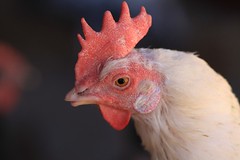 On egg farms, to prevent the fighting and aggression that comes with abnormally high stocking densities of living beings, farmers cut off a portion of each hen's beak. This leaves her unable to perform basic chicken things - preening, protecting, eating and drinking normally. A chicken's beak is innervated, it has sensory neurons running to the tip, along with a blood supply. It is vital for a chicken to feel what is touching her beak, to know where base begins and tip ends. So it hurts to have a part of it removed, always done without anesthesia. Sometimes the nerves hurt so much, are so damaged, that they never stop crying, never stop sending messages to the brain that ouch! it hurts.
On egg farms, to prevent the fighting and aggression that comes with abnormally high stocking densities of living beings, farmers cut off a portion of each hen's beak. This leaves her unable to perform basic chicken things - preening, protecting, eating and drinking normally. A chicken's beak is innervated, it has sensory neurons running to the tip, along with a blood supply. It is vital for a chicken to feel what is touching her beak, to know where base begins and tip ends. So it hurts to have a part of it removed, always done without anesthesia. Sometimes the nerves hurt so much, are so damaged, that they never stop crying, never stop sending messages to the brain that ouch! it hurts.And the sound these hens make. The cries. I have never heard anything like it. There is a cadence, a rhythm to it that would almost be comforting if it wasn't so jarring. You never hear this sound in nature or on sanctuaries or in little backyard flocks because it is impossible. No sanctuary has 80,000 hens running free, and if they did, on no sanctuary would you find hens so full of fear. The sound is a cross between the sound a hen makes when cooing to her babies and the sound she makes when fleeing a hungry fox. It is not right or normal.
I think perhaps, on that day, after hours of pulling (legally) hens from these battery cages, I decided not only to respect chickens but to love them fiercely, to pull them into my heart and let them nest. On that day, I saw how cruel and dispassionate people could be, from the worker who calmly cleaned feces-covered eggs to the transport catcher rip wings and break legs as he violently stripped birds from cages. I thought of the people who would see the brown cardboard boxes displaying a happy rooster perched on a fence, never knowing, never having any freaking clue of the suffering from which those eggs came.
And I thought of each hen. The one with a prolapse, her insides gruesomely displayed to the outside world. The one who gently, ever so gently, groomed another. The one with the four inch toe nails, scrabbling to find purchase on the wooden floor of the stock trailer. The bedraggled one who, after seeing the sunlight for the very first time, took a deep breath and died, just like that, deep inhalation, explosive exhalation, then nothing. I thought of them all, sitting in a horse trailer, with more room than they ever had...yet still clumped in tightly packed circles. To these deprived birds, freedom was not a victory, it was - in its own sad way - a torment.
It took them weeks to learn how to walk again, months to gain the necessary muscle strength to perch. The most beautiful moments were so simple, so plain in a chicken's world. The first time a hen learned she could stretch her wings. She would do it incessantly, feeling how her muscles and tendons worked, how they curved and bended and oh my! how they would lift her off the ground. The first time a hen saw and tasted grass, how she tentatively, gently grasped each strand with her mangled beak. Or the first time she chose where to roost at night, sometimes shoving other hens, even roosters, from her chosen spot.
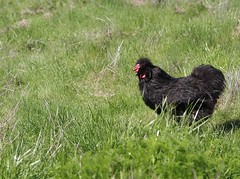 |
| Where my ladies at? |
 I want you to know some chickens are empathetic. Some are not. Some are mean, really mean. Spiteful, even. But some are kind and generous, sharing their warmth, their perch, their food with those less fortunate. When Bertha, an older, arthritic hen, saw Aurora, the smallest, skinniest, runtiest of all chick hens, shivering and alone, Bertha offered her space on the perch, a wing to stay warm by. For many days after Bertha died, Aurora maintained vigil on that same perch spot, even braving pecks from the bigger, meaner hens. I want you to know that some chickens mourn, fiercely.
I want you to know some chickens are empathetic. Some are not. Some are mean, really mean. Spiteful, even. But some are kind and generous, sharing their warmth, their perch, their food with those less fortunate. When Bertha, an older, arthritic hen, saw Aurora, the smallest, skinniest, runtiest of all chick hens, shivering and alone, Bertha offered her space on the perch, a wing to stay warm by. For many days after Bertha died, Aurora maintained vigil on that same perch spot, even braving pecks from the bigger, meaner hens. I want you to know that some chickens mourn, fiercely.I want you to know some chickens, even after being ignored or mishandled by humans, are genetically hard-wired to be curious and inquisitive. They will touch you with their beaks, gaze deeply into your eyes, and I want you to know that you will believe them alive and intelligent and you will know their otherness.
I want you to know that when a chicken takes their last breath on the sanctuary, it is like a person. It is in that moment they are so very alive, so vital, so full of spirit, and then they are not. Then they are a husk, a shell. Before, a chicken. Now, a corpse. Before, a human. Now, dead.
I want you to know that when a chick is growing in his embryo, he hears everything going on outside, just like a human baby. That he listens for his mother's voice, recognizing it as unique. He will not respond to any other hen's voice like this, not ever. Hers is a siren's song, and it keeps him rooted and calm. When he breaks out of his shell, he will need her help to push through. He will seek her voice, her face, her smell. He will be far more precocious than any human baby, but he will still cheep and cry the moment the outside air touches his nose and he breathes it in for the first time.
 I want you to know that everything in between is just like our everything in between. There is drama and "things that must be done". There is love and jealousy and disputes over territory. There is fear and pain too. There are families and friends and enemies as well. There are songs and dances and things that keep the unit together against things that would tear them apart. There are brave heroics, like the mother hen who fights to the death against the shelter-seeking rattlesnake. There are cowards, like the rooster who does not warn the other chickens of the hawk but seeks shelter himself.
I want you to know that everything in between is just like our everything in between. There is drama and "things that must be done". There is love and jealousy and disputes over territory. There is fear and pain too. There are families and friends and enemies as well. There are songs and dances and things that keep the unit together against things that would tear them apart. There are brave heroics, like the mother hen who fights to the death against the shelter-seeking rattlesnake. There are cowards, like the rooster who does not warn the other chickens of the hawk but seeks shelter himself.They are so like us, so different, so alien in many ways. Both their differences and similarities contribute to their specialness, so often neglected and ignored by most people. But not by me. And if you've gotten this far, I hope not by you either.
All I ask is this...think briefly, gently, and kindly of chickens. Think of how if you are given the choice between causing them more harm or less, that maybe you'll consider the latter. Imagine making different choices in what you eat, and then once your imagination has blown you away with its awesomeness, make those choices. You are more powerful than you think.
At least to her, you will be.

No comments:
Post a Comment